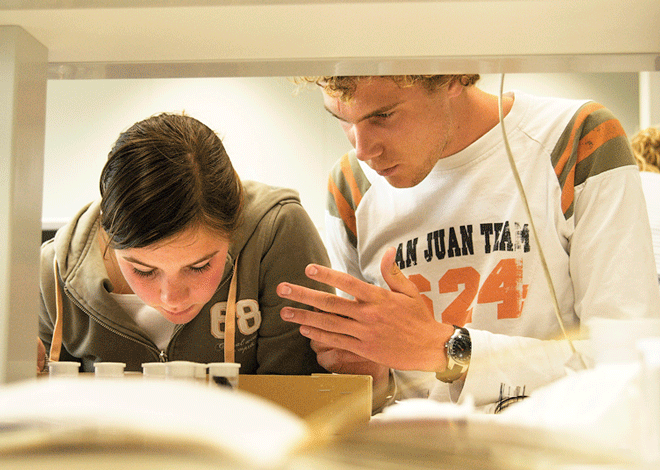Guidance and assistance universities offer
It’s important for students to be able to effectively compare study programmes. Especially when it comes to the available student support, there are clear differences. What guidance and assistance universities offer students?

What guidance and assistance research universities and universities of applied sciences offer students?
Research university and university of applied sciences students have a lot more responsibility than secondary school students. In school, you always have a mentor who monitors progress and regularly initiates a talk with the student and their parents. In higher education, things work differently. One big difference is that as a rule, a research university or university of applied sciences only communicates with students, not with parents. There are no mentor talks or parent-teacher conferences like in secondary school. Nor are students given report cards.
Nevertheless, research universities and universities of applied sciences have many professionals who provide students different kinds of support. And it is also important that parents know what help is available, since nearly every student will at some point need help from one of these professionals.
What guidance and assistance do research universities and universities of applied sciences offer students? The study adviser or study career counsellor
An important contact person is your study adviser or study career counsellor This is someone who plays an important role throughout your studies, from helping you choose a study programme to graduation. As a student, you generally have to take the initiative to contact your study adviser. The ‘reinforcements’ don’t usually come to you. The most important issues you can discuss with your study adviser or study career counsellor are
- Your choice of study: Is this the ideal study programme for me? Does this study programme suit me? Are there comparable study programmes?
- Finding your way: Once you start with your studies… Good contact with your study adviser is important for a good start.
- When things don’t work out: A study adviser can help you and in some cases refer you further if you don’t have enough credits or if you have doubts about your choice of study programme.
- Choosing subjects: Every study programme has room for optional subjects, usually starting in the second year. The study adviser can help you make the right choice.
- Choosing a Master’s programme: After completing a university Bachelor’s programme , most students enrol in a university Master’s programme. Students who complete a university of applied sciences Bachelor’s programme can also enrol in a Master’s programme. The study adviser or study career counsellor can help you make the right choice. Which Master’s programme suits you best, and what are the admission requirements?
- The study adviser or study career counsellor can help you with any study-related problems, such as discipline, motivation, fear of failure, concentration problems, study planning, etc. If needed, the study adviser can also refer you to other professionals.
What guidance and assistance do research universities and universities of applied sciences offer students? The student counsellor
The student counsellor has a different function than a secondary school career adviser. A school career adviser mostly helps students choose a study programme. The student counsellor can help with
- Studying with a functional disability or impairment
- Study delay due to exceptional circumstances
- Regulations and provisions (for example for top athletes and curriculum adjustments)
- Taking a break from your studies, ending your enrolment, or opting for another study programme
- Financial matters (including student grants and loans or applying for the Profiling Fund if you accrue study delay due to exceptional circumstances)
- For mediation in case of problems, complaints, or objection and appeal procedures
What guidance and assistance do research universities and universities of applied sciences offer students? The student psychologist
A student psychologist is mostly there to help with personal problems and high levels of stress. For many students, contacting the student psychologist is a big step that may feel like failure. It really shouldn’t, though. It’s actually very powerful to seek help when you need it.
There are other professionals available who offer guidance and assistance, but these are the most important ones. I always advise parents to make sure they know which professionals can help. That way, as a parent, you can better guide your child where needed. Students can also find out who they can contact.
What guidance and assistance do research universities and universities of applied sciences offer students? Read the study programme leaflet
There are substantial differences in the guidance and assistance offered by research universities and universities of applied sciences. I find it important that prospective students and their parents also consider this aspect. What guidance do students receive? How happy are current students about the guidance and assistance they receive?
You sometimes hear that universities of applied sciences offer more guidance than research universities. But this is not always the case. Sometimes, smaller research university study programmes actually offer more and better guidance than larger study programmes at a university of applied sciences. So my advice is to do your homework and compare study programmes.
In conversation with study adviser Evelien Meijs: guidance and assistance

Evelien Meijs
“A study adviser is the first point of contact for students ,” says Evelien Meijs, student adviser at International Development Studies “We can help students at any stage of the process, from choosing a study programme to graduation.”
Evelien Meijs
First contact
“Our first contact with students usually takes place when they’re still exploring their options. For some, it feels like a big decision that they’ll be ‘stuck with’ for the rest of their life. In practice, things are more nuanced. Even after registering for a Bachelor’s programme, you still have a lot of space for choices. There are many options for optional courses, and again when selecting a Master’s programme, should you opt for one. For me, the most important thing is that students are enthusiastic about studying their chosen discipline. And if it turns out that this was not the best choice, I can help them to make a new study choice. Having once made a ‘wrong’ choice, people tend to make far better, more conscious choices. Afterwards, I often hear students say that they learned a lot from it.”

First meeting at the Annual Introduction Days (AID)
“We first meet the new first-year students at the study day during the Annual Introduction Days (AID). As study advisers, we organise an introductory session with the group. During the Annual Introduction Days, we introduce ourselves and talk a little bit about ourselves and our role as study advisers. Last year, I introduced myself using an old holiday photograph, to retain a bit of the holiday feeling. Not to talk about my holidays, but as a metaphor for their study career. Looking at it as a journey with choices, and different paths you can take.
Study career as a journey: guidance and assistance
What does this photograph have to do with students and with me? You can look at your study career as a kind of journey. With the mountain top as the graduation moment. First-year students are at the start of their journey: they’re getting to know each other, finding their way, getting used to their new environment. They will make new friends. They will learn the contents of their study programme, but also grow as a person, and in the process, they will increasingly discover the direction that best suits them. As they progress, they will sometimes move fast and with lots of energy. At other times it will feel like they’re climbing a steep slope: things will slow down, or they may accrue some study delay.”
The study adviser as a guide
“Students have to walk this path on their own, but they can see me as a kind of guide. The study adviser or study career counsellor is the person who can advise them and show them alternative paths. Of course, students have to walk this path themselves, but as study advisers, we can guide and assist them. We can think along, advise, and help with planning and choices. And if a student accrues study delay or if personal circumstances arise that make things more difficult, we are here to listen and to help think of solutions.
Some students come to me more often than others. Some need more help and explanation. It is our task to support students on this path, until they finally – independently – reach that mountain top.”
The role of parents
I ask Evelien about her perspective on the parents’ role in this process. “Parents are important advisers for students. And at the same time we want and need to respect students’ privacy. In principle, we don’t talk to parents, unless a student wants us to, in which case we can for example organise a joint talk with them and their parents. It’s good for parents to know what we can do for students in our role as study advisers. If a parent notices that a student is struggling personally or with the study materials, they can encourage their child to contact us. In practical terms, parents can look up the name of the relevant study adviser. This makes it easier to say something like: Are you struggling with planning your courses? Why don’t you ask Evelien to help you? Because we’d love to help!.”
Should students contact you themselves?
I ask Evelien whether students should contact the study career counsellor or study adviser themselves. “Yes, that is how it’s done,” says Evelien. “At the research university or university of applied sciences, students are responsible for their study progress.” If problems arise, it’s important that the student takes the initiative to seek help. Parents can play a role in this, by encouraging their child to seek help in time. This is nothing to be ashamed of; on the contrary, it’s a very good idea.”
First term
“In the first term, we organise introductory talks with all first-year students, in small groups. We hope that this makes it easier for them to contact us when problems arise. We initiate contact for example when we see that a student’s results are very poor or when we suspect that there may be difficult personal circumstances. In such cases, I may invite the student in for a chat, but the student ultimately decides whether they want to come or not.”
Additional support
“At our university (and at many other institutions), we have not only study advisers, but also student counsellors and student psychologists. I can refer students to them for additional support. Sometimes, it makes sense for a student to follow a study skills programme to learn to study better; other times a student may experience too much stress because of dyslexia or some other factor. We have support and help available for many problems. Ultimately, it’s up to the student to make use of these facilities.”
When things go remarkably well
“There are also students who fly through their study programme and find it all far too easy. These students can also come to us for help. Usually, they could use some more challenge. I inform them about the possibilities, for example for taking on additional courses or some other challenge. I think along with them about what would suit them best. There are no additional costs involved. For the same tuition fees, you can make your study programme broader or heavier.
I also completed this study programme, and I have some experience in this field, which helps me to think along in concrete terms about interesting additions to the direction the student has in mind.”
A Master’s programme after your Bachelor’s
“After completing a university Bachelor’s programme students usually enrol in a Master’s programme . A research university Bachelor’s programme prepares you for an academic Master’s programme, which in turn prepares you to exercise a profession. This completes your university education. You can follow a contiguous Master’s programme at the same university, or at another university. In this case, you may have to fulfil additional admission requirements. Students also often come to me to discuss their choice of Master’s programme. Because choosing a Master’s programme is once again a real study choice moment.”
Top of the mountain
“In this way, the student ultimately independently reaches the ‘top of the mountain’, the moment of graduation. I feel that it’s a privilege to watch from the sidelines and see how a person develops throughout these years. So much happens to them in a relatively short period of time. From in some cases very young and shy students at the start of their studies, I see how they grow and mature. In their field of study, as people, and as future professionals. They learn to know themselves better and to deal with setbacks. They discover what interests them and what doesn’t. And finally, they are rewarded with a beautiful diploma. It’s amazing to be able to witness and guide this process.”

